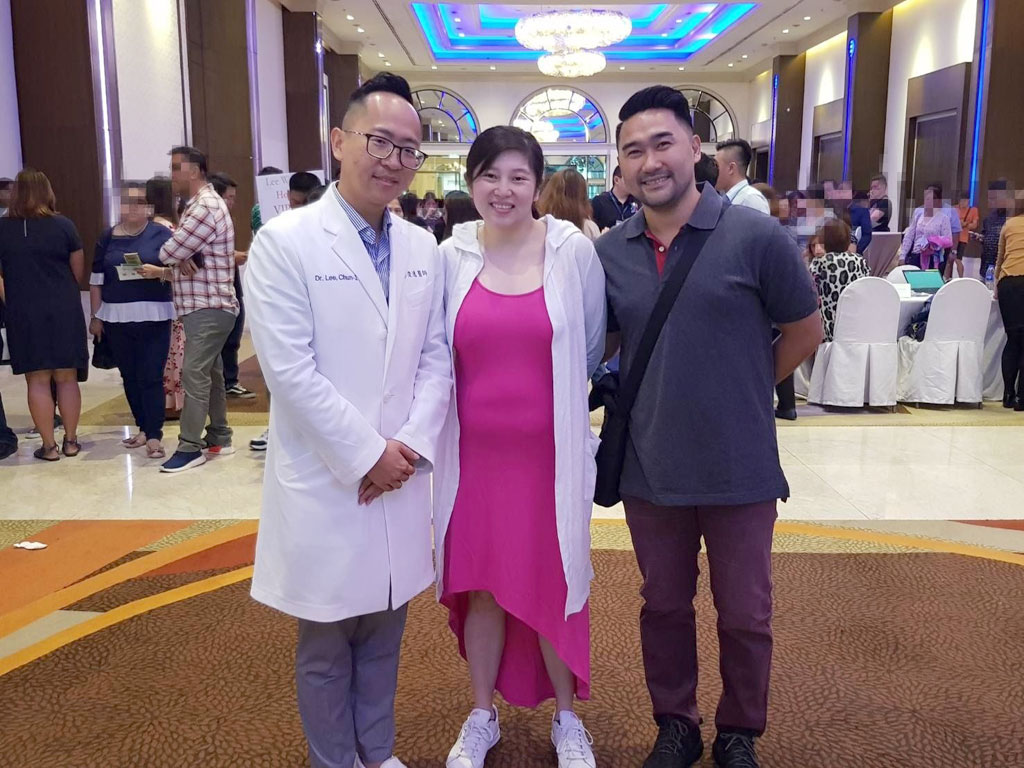Latest News
2018.08.16
Another kind of pride from Taiwan, Lee Women’s Hospital helps couples in the Philippines who have been infertile for 11 years to complete their dreams
Taiwan Journalists Association
For Henry and Aireen from the Philippines, this year is the most memorable year in their lives.
They’ve tried for 11 years only to have their own children. However, because the wife had problems with polyps and immune diseases, and the husband had weak spermatozoa and abnormal sperm, they held the last hope after several failed artificial pregnancy in Philippines and came toLee Women’s Hospital's reproductive medical center located in Taichung, Taiwan under a friend's introduction. Finally, with the help of the 3.5-generation AI IVF leading in Asia, the wife successfully got pregnant at the first attempt of the implantation. At present, the couple is happy to prepare for the arrival of a new life. They also specially participated in the patient consultation held by Lee Women’s Hospital in Manila, and used their own examples to encourage more than 200 infertile couples in the conference.
The 33-year-old Melissa, also from Manila, failed to conceive naturally after waiting for 8 years, she was found to have premature ovarian failure after examination which will have menopause 2 to 3 years later.After failure of 2 artificial fertilization and one IVF in Philippine, she came to Lee Women’s Hospitalunder a introduction from a friend. In the use of 3.5-generation AI IVF, the hospital chose the best embryo for implantation and succeeded in the first attempt. This technology has also helped many women at advanced maternal age, with recurrent miscarriages, and it has been clinically proven to reduce miscarriage rates and increase pregnancy rates. So the Filipino couple Akilit even traveled thousands of miles by taking a 7-hour bus from the city where they lived to Manila and then a 3-hour flight to Taiwan to see a doctor, that is because her obstetrician and gynecologist was once a patient at Lee Women’s Hospital success on the first attempt, Akilit then using Taiwan’s advanced equipment and technology leading in Asia, she finally became a mother successfully!
The 3.5-generation AI IVF is a new technology based on PGS plus the embryo time-lapse monitoring system. PGS is mainly used to treat women at advanced maternal age, repeated miscarriages, and familial hereditary diseases, which can accurately rule out chromosomal abnormalities. And with the big data provided by the latest artificial intelligence-embryo image time-lapse monitoring system, physicians can observe embryo growth without removing the embryo. This technology has greatly increased the pregnancy rate of IVFs by as much as 70% from an average of 50% to 60%, and has attracted the attention of a large number of overseas infertile couples.
The Philippines plays an important role in Taiwan's New Southbound Policy, and the soft power of Lee Women’s Hospital reproductive medicine center also represents Taiwan and has done the best in national diplomacy. Even the City Councilor of Philippine Maybelyn Fernandez also came to Taiwan through the introduction of relatives and friends after failing three artificial fertilizations in Philippines. Under the treatment of Professor Lee Mao Sheng, the infertility authority and director of Lee Women’s Hospital, Maybelyn finally gave birth to a healthy and beautiful girl in February 2017, and expresses her appreciation to the Filipino for Taiwan's medical profession! The pregnancy rate for infertility treatment in Taiwan is the second highest in the world, but the cost is only half that of Singapore, Hong Kong, and Thailand. The hospital has also set up an English-speaking international department to serve VIPs from Philippines. It is hoped that with the help of professionals and advanced technology, more Filipino couples will be able to give birth to their own healthy babies. It also allows Taiwan's medical strength to step out of Taiwan and into the world!





